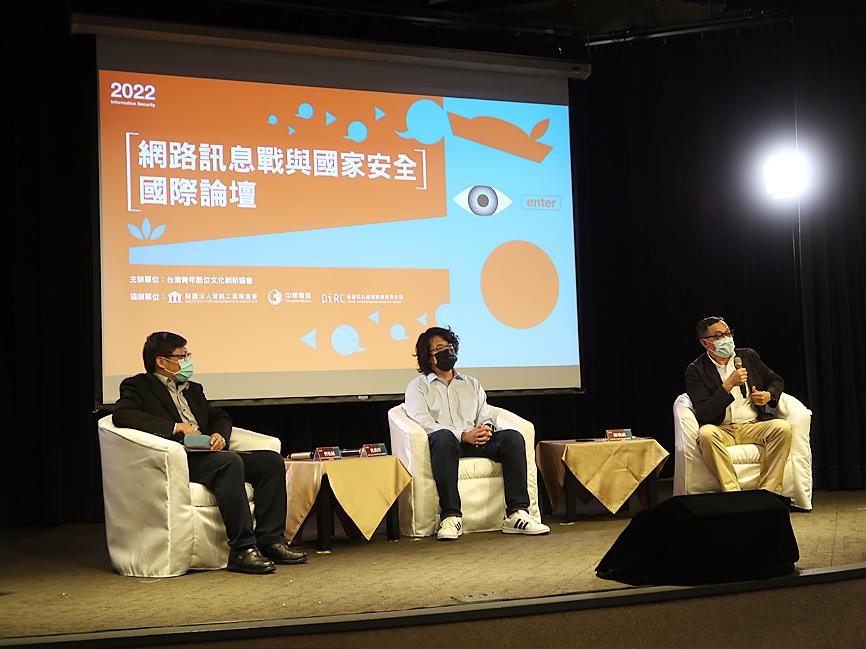China’s cognitive warfare tactics against Taiwan include spreading anti-US and anti-Japan messages to wear down Taiwanese’s psychological defenses, an information warfare expert said yesterday.
Shen Pao-yang (沈伯洋), an assistant professor at National Taipei University’s Graduate School of Criminology, made the remark at a forum on online information warfare and national security at the university’s GIS Convention Center.
Most young Taiwanese do not take a pro-China stance, so rather than sending pro-China messages, Beijing has turned its focus on directing Taiwanese’s mistrust at the US, he said.

Photo: Chen Yu-fu, Taipei Times
Unlike Ukraine, which has quickly identified “fifth column” units embedded in the country, Taiwan might not be able to do so if a war were to break out with China, he said.
Fifth column infiltrators and local collaborators could cause great harm during a war by spreading disinformation, he added.
Taiwanese’s psychological defenses are the most important factor to consider while making assumptions about a war, Shen said, adding that many Taiwanese have said they might surrender in the event of a war with China, which would leave other countries powerless even if they wanted to help Taiwan.
Shen said he used to advocate for exposing such cognitive warfare tactics, but they can only be exposed through judicial investigations, which require legal grounds.
A new mechanism is needed, as the Criminal Investigation Bureau can only pursue tax evasion charges or launch investigations based on the Money Laundering Control Act (洗錢防制法), which might only have an indirect connection with a case, he said.
Shen said he often hears young people saying they would like to receive information from various sources, including China, Japan and the US, before making a judgement while maintaining a neutral stance.
He said the “neutral stance” points to a lack of awareness of the enemy, adding that exposing China’s tactics would be ineffective if such awareness and psychological defenses are not developed first.
He and his friends have been criticized for promoting an “all-out defense,” yet China is most afraid of Taiwanese building defensive awareness, he said.
Academia Sinica academician and former National Security Council adviser Lee Der-tsai (李德財) told the event that Chinese sources have spread a false report that Taiwanese were celebrating the assassination of former Japanese prime minister Shinzo Abe, to sow animosity between Taiwan and Japan, and create social discord in Taiwan.
Taiwan must be prepared for such operations and “boost its immunity against misinformation,” he added.

CHAOS: Iranians took to the streets playing celebratory music after reports of Khamenei’s death on Saturday, while mourners also gathered in Tehran yesterday Iranian Supreme Leader Ayatollah Ali Khamenei was killed in a major attack on Iran launched by Israel and the US, throwing the future of the Islamic republic into doubt and raising the risk of regional instability. Iranian state television and the state-run IRNA news agency announced the 86-year-old’s death early yesterday. US President Donald Trump said it gave Iranians their “greatest chance” to “take back” their country. The announcements came after a joint US and Israeli aerial bombardment that targeted Iranian military and governmental sites. Trump said the “heavy and pinpoint bombing” would continue through the week or as long

TRUST: The KMT said it respected the US’ timing and considerations, and hoped it would continue to honor its commitments to helping Taiwan bolster its defenses and deterrence US President Donald Trump is delaying a multibillion-dollar arms sale to Taiwan to ensure his visit to Beijing is successful, a New York Times report said. The weapons sales package has stalled in the US Department of State, the report said, citing US officials it did not identify. The White House has told agencies not to push forward ahead of Trump’s meeting with Chinese President Xi Jinping (習近平), it said. The two last month held a phone call to discuss trade and geopolitical flashpoints ahead of the summit. Xi raised the Taiwan issue and urged the US to handle arms sales to

State-run CPC Corp, Taiwan (CPC, 台灣中油) yesterday said that it had confirmed on Saturday night with its liquefied natural gas (LNG) and crude oil suppliers that shipments are proceeding as scheduled and that domestic supplies remain unaffected. The CPC yesterday announced the gasoline and diesel prices will rise by NT$0.2 and NT$0.4 per liter, respectively, starting Monday, citing Middle East tensions and blizzards in the eastern United States. CPC also iterated it has been reducing the proportion of crude oil imports from the Middle East and diversifying its supply sources in the past few years in response to geopolitical risks, expanding

Pro-democracy media tycoon Jimmy Lai’s (黎智英) fraud conviction and prison sentence were yesterday overturned by a Hong Kong court, in a surprise legal decision that comes soon after Lai was jailed for 20 years on a separate national security charge. Judges Jeremy Poon (潘兆初), Anthea Pang (彭寶琴) and Derek Pang (彭偉昌) said in the judgement that they allowed the appeal from Lai, and another defendant in the case, to proceed, as a lower court judge had “erred.” “The Court of Appeal gave them leave to appeal against their conviction, allowed their appeals, quashed the convictions and set aside the sentences,” the judges